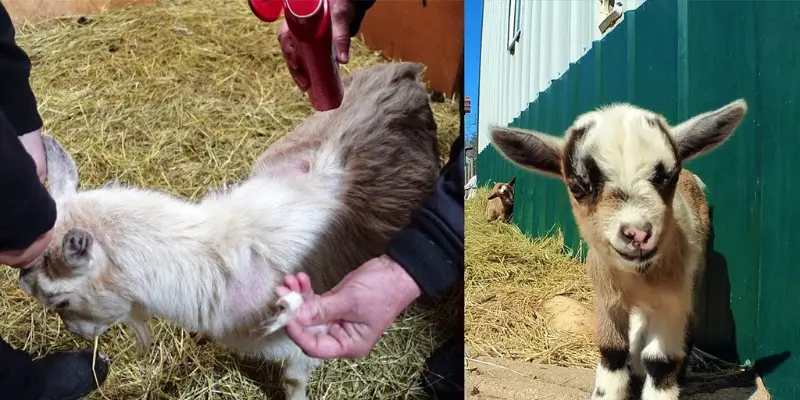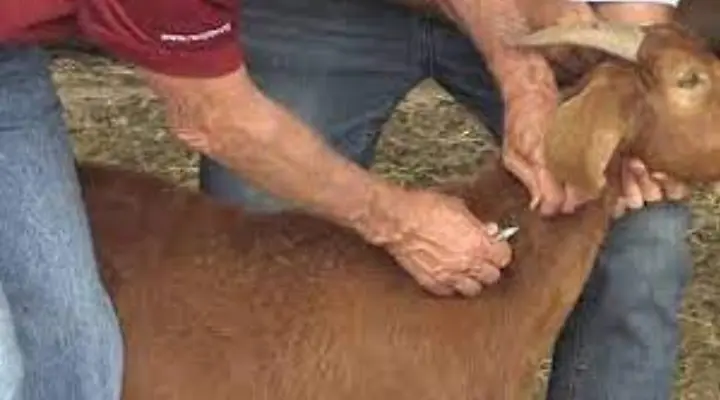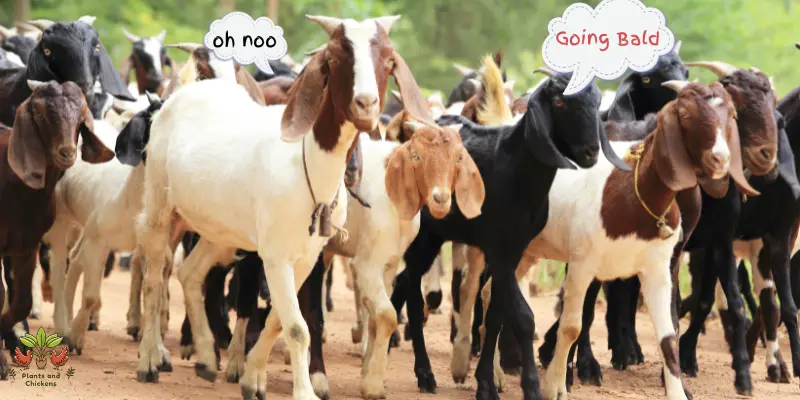If your goat losing hair, it could be due to traumatic causes like rubbing against objects. To treat hair loss in goats, modify the environment to alleviate the problem and ensure there are no parasites, tight feeders, or fence-related issues.
Additionally, avoid using toxic parasite treatments unless necessary. Hair loss can also result from nutritional deficiencies, such as zinc deficiency in Angora goats, stress, or hormonal imbalance. It is essential to identify the underlying cause and provide appropriate treatment to promote healthy hair growth in goats.
Table of Contents
Causes Of Hair Loss In Goats
Hair loss in goats can be concerning for backyard goat owners. Understanding the possible causes of goat losing hair is essential in order to provide appropriate treatment and prevent further complications. Here are some common causes of hair loss in goats:
Parasites
Parasites such as mites, ticks, and lice can infest goats and lead to hair loss. These parasites irritate the skin and cause goats to scratch or rub against objects, resulting in hair loss. It is important to regularly inspect goats for signs of parasite infestation, especially in areas such as the ears, muzzle, inner thighs, hocks, and underside.
Nutritional Deficiencies
A deficient diet lacking in essential nutrients can contribute to goat losing hair. One of the common nutritional deficiencies that can cause hair loss is zinc deficiency. Zinc plays a vital role in fiber production, particularly in Angora goats. Hair loss due to zinc deficiency is often observed around the head, neck, flanks, perineal areas, and lower limbs.
Fungal Infections
Fungal infections, such as ringworm, can also lead to goat losing hair. Ringworm is a highly contagious fungal infection that causes circular patches of hair loss. It commonly affects young and immunocompromised goats. Prompt treatment with antifungal medications is necessary to prevent the spread of infection and alleviate hair loss.
Key Takeaways:
Parasites such as mites, ticks, and lice can cause hair loss in goats.
Nutritional deficiencies, particularly zinc deficiency, can contribute to hair loss.
Fungal infections, such as ringworm, can lead to circular patches of hair loss.
By identifying the underlying cause of hair loss in goats, owners can take appropriate steps to address the issue and ensure the well-being of their animals. Regular parasite control measures, a balanced diet, and prompt treatment of fungal infections are crucial in maintaining healthy coats and minimizing hair loss in goats.
Diagnosing Hair Loss In Goats
Goats can lose hair due to various reasons such as parasites, zinc deficiency, or stress. To treat hair loss in goats, it is important to identify the underlying cause and make necessary modifications to the environment or provide supplements if needed.
If the hair loss is severe or accompanied by other symptoms, consulting a veterinarian is recommended.
When it comes to diagnosing goat losing hair, it is important to carefully assess the physical characteristics and health of the animals. Identifying the underlying cause of hair loss is crucial in order to implement an effective treatment plan. Several methods can be used to diagnose goat losing hair, including physical examination, skin scraping, and blood tests.
Physical Examination
A thorough physical examination is the first step in diagnosing hair loss in goats. This involves visually inspecting the affected areas and checking for any abnormalities or signs of infestation. During the examination, it is important to pay attention to the location and pattern of hair loss, as well as any accompanying symptoms such as itching or redness.
Skin Scraping
Performing skin scraping is another diagnostic technique commonly used in goat losing hair identification. This involves gently scraping the skin surface using a scalpel or a microscope slide to collect samples of skin cells or potential parasites. The collected samples are then examined under a microscope to identify any mites, lice, fungi, or bacteria that may be causing the hair loss.

Blood Tests
In some cases, blood tests may be recommended to diagnose goat losing hair treatment. These tests can help identify any underlying health problems or nutritional deficiencies that may be contributing to their hair loss. Blood tests can provide valuable information about the goat’s overall health, including hormone levels, vitamin and mineral deficiencies, and immune system function.
In conclusion, diagnosing hair loss in goats requires a comprehensive approach that involves a physical examination, skin scraping, and potentially blood tests. These diagnostic techniques help identify the underlying cause of hair loss, allowing for effective treatment strategies to be implemented. It is important to seek veterinary guidance for proper diagnosis and treatment.
Treating Hair Loss In Goats
Is your goat losing hair? There could be various reasons behind it, from parasites to zinc deficiency. Make sure to examine your goat for any signs of infestation and modify its environment if necessary. Avoid using toxic parasite treatments unless absolutely necessary.
Parasite Control
Proper parasite control is essential for treating hair loss in goats. Parasites such as mites, lice, and ticks can cause irritation and lead goat losing hair. To effectively control parasites, it is important to regularly inspect your goats for signs of infestation. This can include excessive scratching, rubbing against objects, or the presence of visible parasites on their skin. Treating parasites usually involves using anti-parasitic medications, which are available in various forms such as sprays, powders, and pour-ons. It is crucial to follow the instructions provided by the manufacturer and administer the medication accordingly to ensure effective parasite control and alleviate the symptoms of hair loss.
Balanced Diet
A balanced diet is another important aspect of treating hair loss in goats. Nutritional deficiencies can contribute to hair loss, so it is crucial to provide your goats with a diet that meets their specific needs. Goats require a diet rich in vitamins, minerals, and proteins to maintain a healthy coat. Incorporating high-quality hay, fresh grass, and a supplement formulated specifically for goats can help ensure they receive the necessary nutrients.
Antifungal Medications
In some cases, hair loss in goats can be caused by fungal infections. Antifungal medications can help treat these infections and promote hair regrowth. These medications are available in different forms, including creams and topical ointments. When using antifungal medications, it is important to follow the instructions provided by the veterinarian or the manufacturer.
Make sure to clean the affected area thoroughly before applying the medication and continue the treatment for the recommended duration to ensure complete elimination of the infection. Regularly monitoring the progress and consulting with a veterinarian can help determine the effectiveness of the treatment and make any necessary adjustments.
By implementing effective parasite control measures, maintaining a balanced diet, and using appropriate antifungal medications, you can successfully treat hair loss in goats. Remember to regularly evaluate your goats’ health, provide them with proper care, and consult with a veterinarian for guidance and support in managing goat losing hair effectively.

Frequently Asked Questions For Why Is My Goat Losing Hair How To Treat Hair Loss In Goats
How Do You Treat Hair Loss In Goats?
To treat hair loss in goats, first, check for any signs of parasites or tight feeders. Modify the environment to alleviate rubbing against objects. Avoid toxic parasite treatments if possible. Zinc deficiency can also cause hair loss, so ensure goats get enough zinc in their diet.
Mites or mange can cause hair loss on the legs or feet, in which case a skin scrape or plug is needed for diagnosis. Additionally, stress or hormonal imbalance can contribute to hair loss.
What Vitamin Deficiency Causes Hair Loss In Goats?
A zinc deficiency can cause hair loss in goats, particularly around the head, neck, flanks, perineal areas, and lower limbs. Adding a zinc supplement to their diet can help alleviate this issue.
Why Is My Goat Losing Weight And Hair?
Goats may lose weight and hair due to parasites, trauma, zinc deficiency, or mites. Adjusting the environment and treating parasites can help alleviate the issue. Check for signs of zinc deficiency or mites and consult a veterinarian if necessary.
Why Is My Goat Losing Hair On Her Ears?
Goats can lose hair on their ears due to scabies mites. These mites burrow under the skin and can cause crusted lesions and hair loss. The ears, as well as other areas like the muzzle, inner thighs, hocks, and underside, can be affected.
Conclusion
To treat goat losing hair, it is important to determine the underlying cause. Whether it’s due to parasites, nutritional deficiencies, or other factors, modifying the environment and providing necessary supplements can help alleviate the issue. Remember to avoid using toxic parasite treatments unless absolutely necessary.
By addressing the root cause, you can help your goat regain its healthy hair coat and overall well-being.


![Terrifying Trend: Why Do Roosters Chase Humans? [2024]](https://plantsandchickens.com/wp-content/uploads/2024/02/why-do-roosters-chase-humans-4.webp)


Leave a Reply